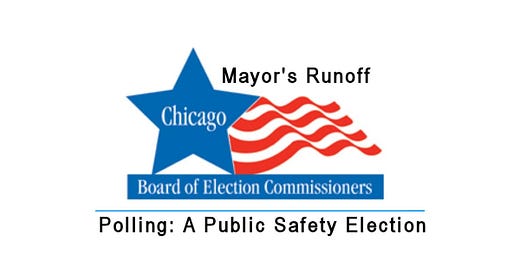CHICAGO VOTERS WANT MORE PUBLIC SAFETY
But, they seem a little confused on the impact of weakened laws and policies
Since the Summer of 2021, we have raised the question as to whether Chicago was becoming a Hadleyville. In the 1952 film classic High Noon, the fictional town of Hadleyville was the setting for an epic tale of a broken bond between a community and its marshal. There gunmen openly sought to murder the town marshal, at “high noon,” without any concern the town would stand up in support of the rule of law. Polling this month by the firm Schoen Cooperman Research (SCR) suggests most Chicago voters want greater public safety. That polling is in advance of the 4 April 2023 runoff election for Mayor of Chicago. The polling data also shows most Chicago voters support the Chicago Police Department (CPD).
More Cops, Stronger Response to Crime
Likely Chicago voters disapprove of the job done relative to public safety by soon-to-be-former Mayor Lori Lightfoot and the current Cook County State's Attorney Kim Foxx.
The majority of Chicagoans support the CPD, with 61% holding a favorable to very favorable view of the department. 71% of those surveyed want more police officers. They also want greater accountability for those who commit crimes -- including shoplifting and crimes related to stealing cars.
Fully 54% of the survey participants cited “crime/public safety” as the most important election issue. This rating far outpaced the second most often cited issue of “taxes and spending” (10%).
57% of those surveyed said they feel Chicago is unsafe, including 27% who believe the city is “very unsafe.” More than twice as many believe Chicago is “very unsafe” than feel the city is “very safe.” Just 11% held the “very safe” view. 78% of those polled stated that they believe crime in Chicago is increasing. Just 5% stated that they thought crime was decreasing in the city.
Additionally, 55% of Chicago voters believe that those who commit crime are treated too leniently. This includes 36% who believe that “punishments” for criminals are “much too lenient.” Just 15% of Chicago voters believe that the punishment of criminal offenders is “excessive.” 80% of those surveyed want stronger punishments for repeat offenders.
Confused Chicagoans
However, slightly more Chicagoans support ending “cash bail” (44%) than oppose (39%) the moves by the Democratic-controlled state legislature and Illinois Governor J.B. Pritzker to greatly increase the percentage of accused criminals released pretrial. Here the survey shows some internal conflict, as more Chicago voters also believe the cashless bail approach will make “our communities less safe.” There the breakdown was 45% believing the approach to bail will make communities less safe, with 39% believing the approach will make the system fairer (39%).
Additionally, while those surveyed want more arrests for crimes like shoplifting and stealing cars, they are also confused about police foot chases. Most criminals will seek to avoid arrest when they have the opportunity. They often run, particularly if they think they will get away. Yet 53% of those surveyed said they supported the CPD policy created last summer that “prevents officers from chasing people suspected of committing minor offenses on foot if they run away.”
It is not possible to hold offenders accountable who are never actually brought to court. Perhaps many Chicagoans are confused about this reality. Perhaps they want the benefit of holding offenders accountable, but want them to simply agree not to run.
We would encourage Chicago voters to study our founder’s Police Policy Principles. Yes, every policy must be consistent with the requirements of and support the law and U.S. Constitution. It is the first of Lemmer’s principles. Yet, police policy development is a complex issue.
As crafted, CPD’s foot pursuit policy does not meet the requirements of the six policy pillars, consisting of clarity, courage, consistency, confidence, consensus, and capacity. Policies that reduce the capacity of police agencies to meet their public safety mission are not best practice.
Time Will Tell
Time will tell what the voters who actually participate on election day (or more precisely election weeks) decide on who will be Chicago’s next mayor. The SCR poll gives the edge as of this week to Paul Vallas with 44% support, compared to Brandon Johnson with 39% support. Yet, 17% of those surveyed indicated they were still “unsure.” When factoring how those unsure likely voters were “leaning,” the race was placed at Vallas 47% and Johnson 42%. As such, the edge to Vallas held at 5%. With public safety being the focus issue for Mr. Vallas, it would seem he should be able to hold onto that polling edge in this final week before the election.
The voters polled in this survey indicated they do not want Chicago to become a Hadleyville. Yet, some of the policies they support may make enhancing public safety in Chicago more – not less – difficult. Perhaps Mr. Johnson will make use of that confusion to bolster the support for his candidacy.
See our FULL ARTICLE with additional analysis on the recent polling data on our main site.




